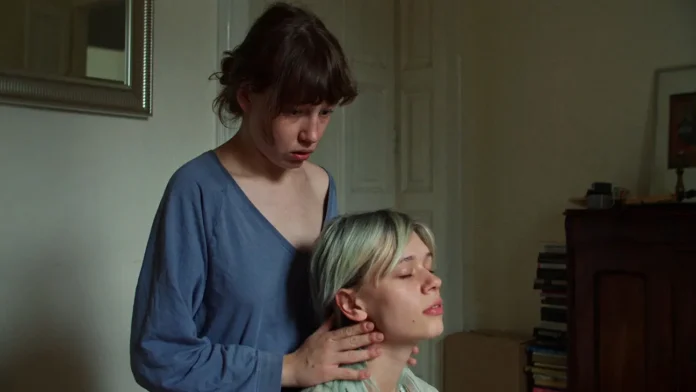Director of films such as Forest (2003), Womb (2010), Just the Wind (2012), and Forest: I See You Everywhere (2021), Hungarian filmmaker Bence Fliegauf has carved a distinctive path through the world of cinema with an eclectic body of often dark, hard-to-classify projects that bear his unmistakable auteur imprint. His latest work, Jimmy Jaguar, which premiered in competition for the Crystal Globe at Karlovy Vary, is no exception—plunging into the realm of demonic possession through the construction of a mockumentary.
The film tells the story of two men in rural Hungary who are arrested for abducting and murdering an elderly hermit—who turns out to be a Serbian war criminal. Interrogated and filmed by the authorities, the two claim that a demon named Jimmy Jaguar, or simply Jagu, had seized their souls and compelled them to commit the crime.
“We were experimenting with a pseudo-documentary format and just couldn’t stop shooting—even though we had no budget.,” Fliegauf told C7nema in an email interview following the film’s world premiere. “Our goal was to create a pilot episode that could also work as a standalone feature. Jimmy Jaguar ended up as a strange pseudo-documentary with a rough aesthetic. I think it works on several levels, but above all, it’s incredibly promising material for a miniseries about a revenge demon—an incorporeal anti-hero who hunts those who are only alive because it’s against the law to kill them.”
Jimmy Jaguar
The genesis of Jimmy Jaguar lies in an industrial disaster in late-1970s Hungary, which left a deep impression on the filmmaker. During the incident—marked by gas leaks from underground and enormous bursts of flames—workers reported seeing a dark presence near the fire. Fliegauf later overheard a firefighter recounting the event, vividly describing the apparition. A man nearby, possibly mentally ill or perhaps possessed, began uttering the name “Jimmy Jaguar.”. That memory haunted Fliegauf for years—until it finally erupted in the form of this film.

“I think of myself as a writer who occasionally makes films,” he says. “ideas are like mental parasites sometimes. They take over my mind, and I can’t get rid of them until I express them. Sometimes it works, sometimes it doesn’t. Jimmy Jaguar is one of the most wicked and powerful possessions I’ve had—it’s still bugging me.”
Fliegauf openly acknowledges the influence of Bulgakov’s The Master and Margarita on the tone of the film, citing its “playful, diabolical atmosphere.” For him, Jimmy Jaguar is a sketch, a test of sorts that might eventually evolve into different forms—including a possible remake in places like the U.S.: “I’d never remake it scene by scene, the way it was done with Funny Games (a masterpiece, in my opinion), but I’d gladly take on the role of showrunner or head writer and build something new from its core concept.”
When asked whether the story had any connection to the current political climate in Hungary under Viktor Orbán, Fliegauf replied that it’s now impossible to separate the president from anything created in the country, since “he owns everything.”
“There are many independent films in Hungary trying to express the tension that bends this country,” he explains, adding that everyone feels that something radical is about to change. “The political atmosphere is truly boiling. However things end for this country, these years will be reflected in its art—unless the intellectuals commit mental suicide. But I’m not a doomer. I believe things are shifting, times are changing—that’s the true nature of the world. We, as artists, just need perspective and time to reflect on all of it. Jimmy Jaguar, especially the ending, is a direct and radical reflection of the reality we live in.”


